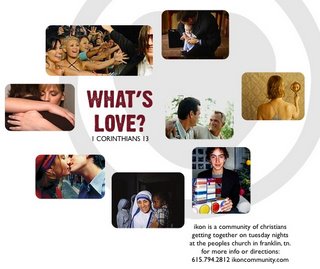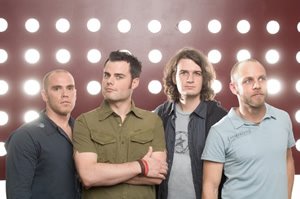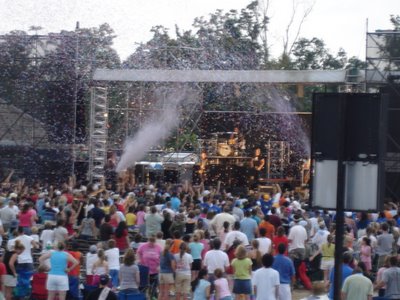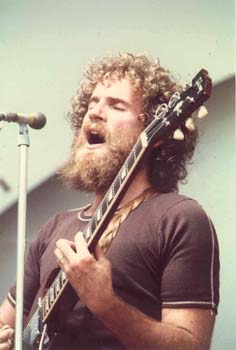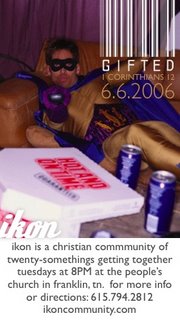Mark Driscoll's giving his approval of a new book by
SPIN writer
Andrew Beaujon called "
Body Piercing Saved My Life: Inside The Phenomenon of Christian Rock" via
his blog. Fascinating since I know from
Mark's latest book that he thinks kids who listen to Christian music have been "forced to ride the cultural short bus." Does this mean the book is kind or unkind to Christian music? I wondered. Luckily Mark linked to a
fluxblog interview with the author where my wondering found some answers...sort of.
I'll read this book, if for no other reasons than to benefit from - and be humbled by I'm sure - an outsider's view of what I do for a living. God knows I have my criticisms about "Christian rock", even my own. May be helpful to see things from the outside looking in.
Here's a taste of that interview from fluxblog.org:
Matthew Perpetua [fluxblog]: As an outsider to the world of Christian music, how did you come to write a book about it?
Andrew Beaujon: Well, it started with a conversation. My friend Jim Coe had just graduated from seminary in Richmond, and we were talking over dinner about his Christian-rock past. I talked to more friends about it, and I found out it was a really common experience for a lot of them - getting really into Jesus as a teenager, attending a festival or two, and then usually getting out of it during college. Jim mentioned that the Cornerstone Festival was a big one, so I pitched a story to the Washington Post about it, and they liked the idea. And that's really how it started. While I was prepping for the article, I couldn't find anything written about Christian rock that wasn't by Christians who loved Christian rock or Christians who loathed it. And being the enterprising sort....
MP: Was there much written about Christian music by non-Christians?
AB: Nothing I could find. The odd sneering article taking that "Planet America" tone, you know what I mean?
MP: Reading the book, I kept running into mentions of acts that I had no idea were Christian. I did not realize how many of the promos I've been sent over the past two years of so had been Christian bands. I've definitely written about a fair few bands without knowing that was part of their past. It's become amazingly mainstream in the last five years, was that part of the interest?
AB: Definitely. I had a similar experience when I was doing a piece on P.O.D. for Spin. I guess I knew they were Christians, but I'd never really given it much thought. But when you look at the numbers of Evangelicals in America, it's really striking how many people have this cultural background.
MP: Was
Pedro The Lion at that first Cornerstone Festival you attended?
AB: Yeah. Bazan was drunk as a skunk.
MP: Were you familiar with Pedro before that show?
AB: Not really. I think the beard kept me away! You know, you're sorting through promos, you see facial hair...
MP: I don't have any idea what David Bazan looks like, actually. I just remember Pedro The Lion being on some decidedly secular mixtapes that I got from a friend back around 1999.
AB: He's interesting, because he does what a lot of Christian artists wish they could. He supports himself on the secular scene; he only does a couple Christian events a year, and I think he does them to mess with people. Not in a mean way -- I think he genuinely wants to shake the foundations of Christian kids' faith, to get them away from the literal take on the Bible.
MP: Do you think he would be able to work so freely outside of the Christian scene if he didn't have so many philosophical differences with the Evangelical movement? Or maybe not able so much as eager and willing.
AB: I dunno. I mean, it doesn't seem to hurt mainstream alternative acts, but on an indie level? I think those kids like their religion ironic.
MP: How much involvement have the
Danielson Famile or
Sufjan Stevens had in the Christian scene relative to Bazan?
AB: Danielson has played Cornerstone. Dunno about Stevens. I saw both at a conference about faith and music. I think Stevens is pretty uncomfortable with that whole scene, but he went to a Christian college, and I'll bet he knows a lot about it. Bazan is like an alien.
MP: How so?
AB: In that he has almost no grounding in pop culture, and you don't have to have grown up Evangelical to like his music. One time we were walking through a parking lot, and someone's car alarm was going off, and I mentioned to him that it sounded like the start of Elton John's "Philadelphia Freedom." He'd never heard the song.
MP: Is there any particular song by Bazan that you find especially interesting or moving?
AB: I really like "Foregone Conclusions.”
MP: If I recall, that's the song with swearing that the Cornerstone people had been freaking out about?
AB: Yeah, that's the one.
MP: What's going on in that song lyrically?
AB: Well, it starts out "I don't want to believe that all of the above is true.” It's about confronting absolute certainty. Christians are obsessed with absolute truth.
MP: How did you come to discover
Larry Norman?
AB: It was just part of the research. He's such a big part of Christian music history.
MP: As of right now, I've only heard "I Wish We'd All Been Ready," which is a pretty amazing song. Is that representative of his catalog?
AB: Kiiiinda. Some of the stuff is great. A lot of it is really average rock music, but there's always his crazy voice and the hectoring lyrics. It's sort of like hearing Pat Buchanan front an acid-rock band.
MP: He's become something of an outsider over time, is that right?
AB: Yeah, as I understand it he's pretty difficult to work with. He really dislikes the Christian music industry, and I get the impression the feeling is mutual. A couple people told me off the record that he's somewhat shunned.
Read the rest
here.






